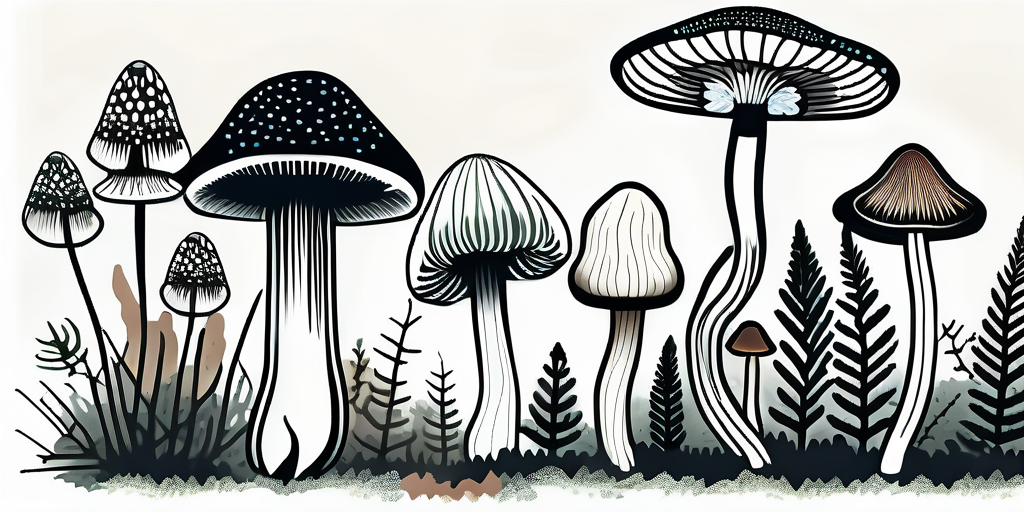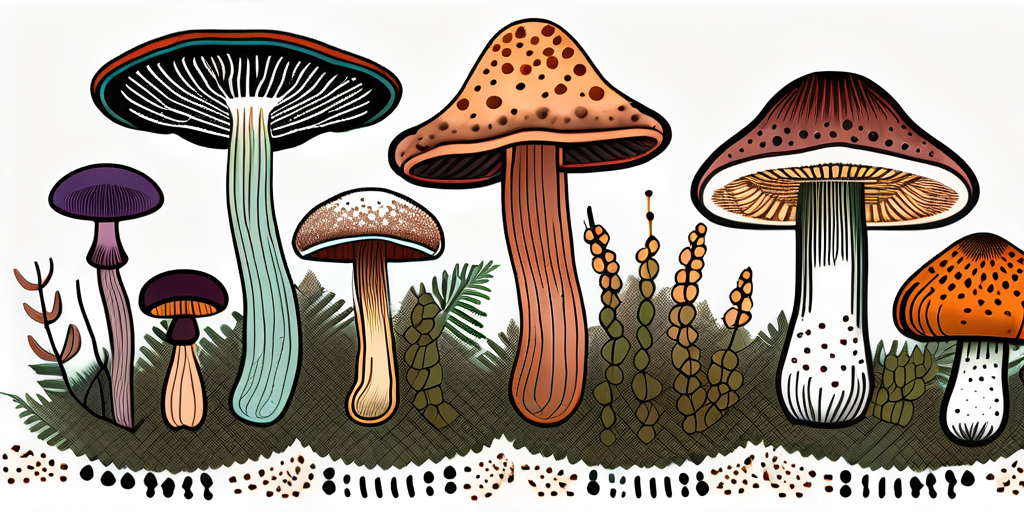Unveiling the Power of Mushroom Adaptogens: Nature's Healers

Unveiling the Power of Mushroom Adaptogens: Nature's Healers
Mushroom adaptogens have been used for centuries in various traditional medicine practices around the world. These natural wonders have gained popularity in recent years due to their incredible healing properties. In this article, we will delve into the basics of mushroom adaptogens, understand how they work, explore their different types, and learn how to incorporate them into our daily lives.
Understanding the Basics of Mushroom Adaptogens
Mushroom adaptogens are a unique category of medicinal mushrooms that help the body adapt to stress and restore balance. But what exactly are they?

When we delve into the world of mushroom adaptogens, we uncover a fascinating array of fungi that possess remarkable properties. These mushrooms, with their intricate biological makeup, hold the key to unlocking the body's potential for resilience and harmony.
What are Mushroom Adaptogens?
Mushroom adaptogens are specific types of fungi that contain bioactive compounds which promote overall well-being and can help regulate various body systems. These extraordinary organisms have been revered for centuries for their remarkable ability to enhance the body's natural defense mechanisms.
Within the realm of mushroom adaptogens, we encounter a diverse range of species, each with its own unique set of qualities. Some notable examples include Reishi, Cordyceps, Lion's Mane, and Chaga mushrooms. These mushrooms have captivated the attention of researchers and health enthusiasts alike, thanks to their potential to support the body's ability to adapt and thrive.
The Role of Mushroom Adaptogens in Nature
In nature, these mushrooms have a symbiotic relationship with their surroundings. They thrive in extreme conditions, such as dense forests or barren landscapes, and have developed mechanisms to protect themselves from harmful forces. These resilient organisms have honed their adaptability over millions of years, making them true masters of survival.
When we consume mushroom adaptogens, we tap into the ancient wisdom of these remarkable fungi. By harnessing their innate abilities to overcome stress and promote balance within the body, we embark on a journey towards optimal well-being.
It is believed that the bioactive compounds found in mushroom adaptogens interact with our body's systems in profound ways. These compounds, such as polysaccharides, terpenoids, and phenolic compounds, have been shown to have antioxidant, anti-inflammatory, and immune-modulating properties.
Furthermore, mushroom adaptogens are thought to support the body's stress response by regulating the production of stress hormones, such as cortisol. By modulating these hormonal pathways, they help restore equilibrium and promote a sense of calm and vitality.
Moreover, these incredible fungi have also been studied for their potential to enhance cognitive function, boost energy levels, and support the immune system. The adaptogenic properties of mushroom species like Lion's Mane have been linked to improved memory, focus, and overall brain health.
As we explore the vast realm of mushroom adaptogens, we uncover a treasure trove of potential benefits. From supporting cardiovascular health to aiding in detoxification, these mushrooms offer a holistic approach to well-being.
In conclusion, mushroom adaptogens are not merely fungi; they are nature's gift to humanity. By incorporating these remarkable organisms into our lives, we have the opportunity to tap into their ancient wisdom and unlock our body's innate ability to adapt, thrive, and restore balance.
The Healing Properties of Mushroom Adaptogens
Mushroom adaptogens offer a wide range of healing properties that can support our overall well-being. Let's take a closer look at two key benefits:

Boosting Immunity with Mushroom Adaptogens
One of the most recognized benefits of mushroom adaptogens is their ability to enhance the body's immune system. These mushrooms contain immunomodulating compounds that help strengthen and regulate the immune response, protecting us from infections and diseases.
Research has shown that certain mushroom adaptogens, such as Reishi and Chaga, have powerful antioxidant properties that can help reduce oxidative stress in the body. Oxidative stress is a major contributor to chronic inflammation and weakened immune function. By combating oxidative stress, mushroom adaptogens can help strengthen the immune system and improve overall health.
In addition to their antioxidant properties, mushroom adaptogens also contain beta-glucans, which are complex carbohydrates that have been shown to stimulate the activity of immune cells. These beta-glucans can enhance the body's natural defense mechanisms, making it more resistant to infections and diseases.
Furthermore, mushroom adaptogens have been found to have anti-inflammatory effects. Chronic inflammation is a common underlying factor in many health conditions, including autoimmune diseases. By reducing inflammation, mushroom adaptogens can help support a healthy immune system and prevent the development of chronic diseases.
Stress Management and Mushroom Adaptogens
Mushroom adaptogens have been widely studied for their stress-reducing properties. By modulating our body's stress response, these adaptogens can help manage anxiety, improve sleep quality, and promote overall mental well-being.
When we experience stress, our body releases stress hormones like cortisol, which can have detrimental effects on our physical and mental health if not properly regulated. Mushroom adaptogens, such as Lion's Mane and Cordyceps, have been found to regulate the production and release of stress hormones, helping to restore balance in the body.
Moreover, mushroom adaptogens have been shown to support the production of brain-derived neurotrophic factor (BDNF), a protein that plays a crucial role in the growth and maintenance of neurons. By promoting the growth of new brain cells and protecting existing ones, mushroom adaptogens can enhance cognitive function and improve mood.
In addition to their effects on stress hormones and brain health, mushroom adaptogens also contain compounds that have a calming and relaxing effect on the body. These compounds can help reduce anxiety, promote better sleep, and improve overall mental well-being.
Overall, mushroom adaptogens offer a holistic approach to stress management by addressing the underlying causes of stress and promoting balance in the body. Incorporating these adaptogens into your daily routine can help you better cope with stress and improve your overall quality of life.
The Science Behind Mushroom Adaptogens
Understanding the science behind mushroom adaptogens can help us better comprehend their powerful effects on our body. Here are two crucial aspects:
How Mushroom Adaptogens Work
Mushroom adaptogens work by interacting with our body's stress response system, known as the HPA axis. This axis is responsible for regulating our body's response to stress, including the release of stress hormones like cortisol.
When we experience stress, the HPA axis is activated, leading to the release of cortisol. While cortisol is essential for our survival and helps us cope with stress, chronic stress can lead to an imbalance in cortisol levels, resulting in various health issues.
Mushroom adaptogens help regulate the production and balance of stress hormones like cortisol, leading to a more balanced and adaptive stress response. They act as modulators, ensuring that our body's stress response is not excessive or inadequate.
These adaptogens have the remarkable ability to sense the body's needs and adapt accordingly. If cortisol levels are too high, they can help lower them. On the other hand, if cortisol levels are too low, they can help increase them. This adaptability is what makes mushroom adaptogens so unique and effective.
The Biochemical Components of Mushroom Adaptogens
These mushrooms contain unique biochemical compounds that contribute to their healing properties. Among these compounds, beta-glucans, triterpenoids, and polysaccharides have been extensively studied for their antioxidant, anti-inflammatory, and immune-enhancing effects.
Beta-glucans, for example, are complex carbohydrates found in the cell walls of mushrooms. They have been shown to stimulate the immune system, enhancing its ability to fight off infections and diseases. These compounds also have potent antioxidant properties, helping to neutralize harmful free radicals in the body.
Triterpenoids, another group of compounds found in mushroom adaptogens, have been found to possess anti-inflammatory properties. They can help reduce inflammation in the body, which is often associated with various chronic diseases, including heart disease, diabetes, and certain types of cancer.
Polysaccharides, which are long chains of sugar molecules, are also abundant in mushroom adaptogens. These compounds have been shown to enhance immune function by stimulating the production of immune cells and promoting their activity. They also have antioxidant properties and can help protect against oxidative stress, a process linked to aging and various diseases.
Furthermore, mushroom adaptogens contain a wide range of other bioactive compounds, including vitamins, minerals, and amino acids, which contribute to their overall health benefits.
In conclusion, the science behind mushroom adaptogens is fascinating and multifaceted. Their ability to modulate the body's stress response and their rich composition of bioactive compounds make them a valuable addition to our wellness routines.
Different Types of Mushroom Adaptogens and Their Benefits
There is a myriad of mushroom adaptogens available, each with its own unique benefits. Let's take a look at two popular types:

Reishi Mushrooms: The Mushroom of Immortality
Reishi mushrooms have been highly regarded in traditional Chinese medicine for centuries. They are known for their immune-boosting effects, anti-inflammatory properties, and ability to support overall vitality.
Lion's Mane Mushrooms: The Brain Booster
Lion's Mane mushrooms are famous for their potential to enhance cognitive function. They have been linked to improved focus, memory, and overall brain health. These mushrooms are a valuable asset for anyone looking to optimize their mental performance.
Incorporating Mushroom Adaptogens into Your Diet
To enjoy the benefits of mushroom adaptogens, you can incorporate them into your daily diet in various ways:
Mushroom Adaptogens in Food and Drinks
You can add mushroom adaptogens to your meals by sautéing them with vegetables, blending them into smoothies, or even brewing them into a delicious tea. These versatile mushrooms can easily be integrated into your favorite recipes.
Mushroom Adaptogens in Supplements
If you prefer a more convenient option, you can find mushroom adaptogens in supplement form. These supplements provide a concentrated dose of the mushroom's beneficial compounds and can be easily incorporated into your daily routine.
Unveiling the power of mushroom adaptogens opens up a world of natural healing and wellness. These incredible fungi have been used for centuries and continue to amaze scientists and researchers with their numerous benefits. By understanding the basics, harnessing their healing properties, and incorporating them into our diet, we can unlock the full potential of nature's healers.











